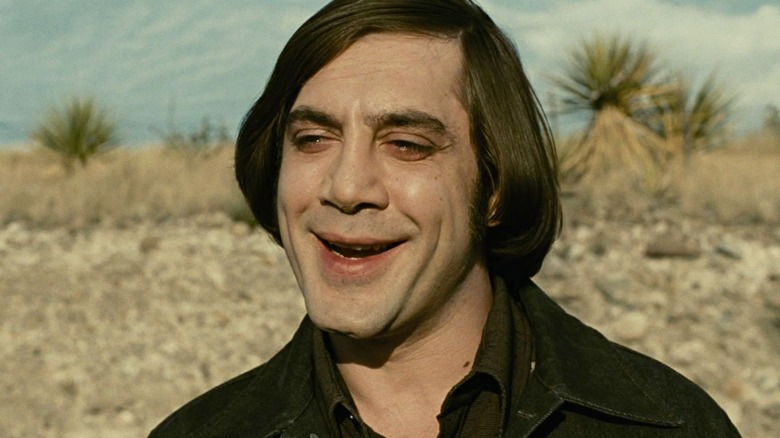
The hitman might be one of the most purely cinematic professions -- the silent, emotionless hired gun without any affiliation or loyalty. They've taken on an almost mythic status that feels completely at odds to the reality. Some are portrayed as sociopaths, some as slick, cool secret agent types. As it is, the numerous cinematic portrayals on film often makes them the most intriguing part of their films.
There are so many depictions of assassins, hitmen, and mercenaries in cinema that it's impossible to do a comprehensive list. So, to narrow it down we're limiting, ourselves to those who take out their targets within the timeframe of the film. Emotional detachment is also key, so there are a couple of notable omissions: John Wick is awesome, but he is mainly concerned with revenge, and we don't actually see him performing professional hits during his films.
Some of the assassins detailed here are the film's protagonist, while others are the antagonist. Hero or villain, all of the entries on this list are unforgettable in their own way.
Hit Girl
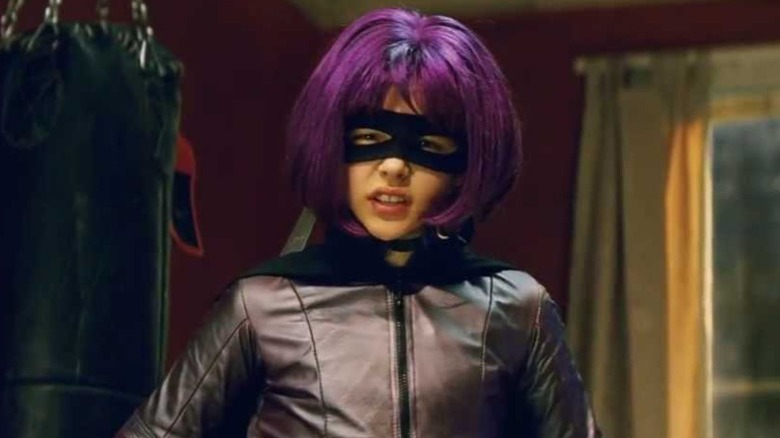
There have been all manner of child assassins on film, from Natalie Portman's Mathilda in "Leon" to Saoirse Ronan's "Hanna." Very few are quite as comfortable with murder as Chloe Grace Moretz's Hit Girl, who appears in Matthew Vaughn's dark comic adaptation "Kick-Ass." Superficially more of a superhero parody, Hit Girl and her father Big Daddy (played with characteristic zeal by Nicolas Cage) have much more in common with hitmen, as they systematically wipe out all of the local gangsters one at a time in scenes of shocking violence until they are inevitably caught by Frank D'Amico (Mark Strong).
In a storyline that plays out like a warped version of "Lone Wolf and Cub," Hit Girl is shown to be incredibly traumatized by her training with her father, despite their superficially idyllic life. Vaughn doesn't shy away from showing their relationship as being incredibly damaging, (he gives her a butterfly knife as a birthday present!) and the scars this leaves on Hit Girl later in the film. Nonetheless, she's a mature, intelligent character who uses her youth as a weapon to lure enemies into a false sense of security.
Ultimately, despite the film's title, much of the story in "Kick-Ass" wouldn't happen without Hit Girl -- Kick-Ass himself is pretty passive, acting as a bystander during much of the action, while Hit Girl drives the story forward. She also gets some sublime action sequences, including a virtuoso scene where she takes out a hallway of gangsters single-handed, accompanied by Joan Jett's "Bad Reputation."
Lorraine Broughton
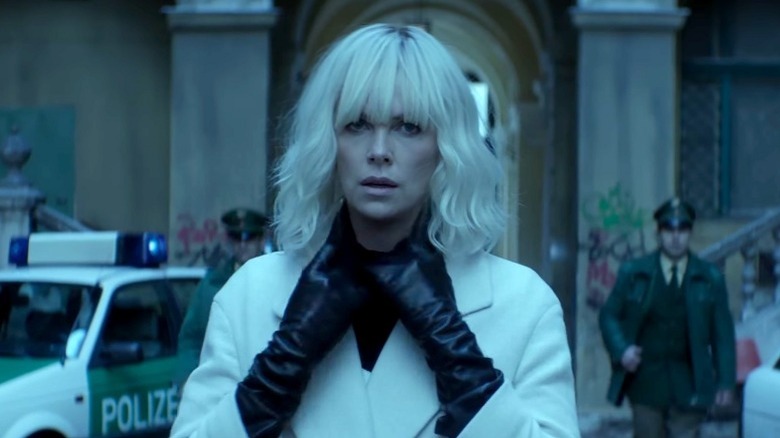
Prior to "Atomic Blonde," Charlize Theron had given numerous performances as mercenaries, including in "Aeon Flux" and "Two Days in the Valley." However, it's her turn as the icy Lorraine that cemented her as one of cinema's best contract killers.
As the MI6 assassin sent in to East Germany to pull out a contact, Theron gives a performance that's both subdued and incredibly physical -- the frenetic 10-minute single-take fight scene as Lorraine works her way down the stairs of an apartment block is expertly choreographed, and is the perfect showcase for her character's abilities. It's a visceral, bone-crunching sequence that recalls the fight scenes of "The Raid," and establishes Lorraine as a force to be reckoned with, fighting tooth and nail with various German hoods and using anything she can get her hands on as a weapon.
"Atomic Blonde" itself may be a bit hit and miss, and often feels like a retread of Steven Soderbergh's "Haywire," but Theron's performance is electrifying throughout. Unlike a lot of the entries on this list, Lorraine is not invulnerable, and is shown to fail a number of times on her mission. She's also clearly not entirely emotionally detached -- it's evident that she feels remorse for every ally that gets killed, in a refreshing change from the typical callous depiction of assassins.
Ghost Dog
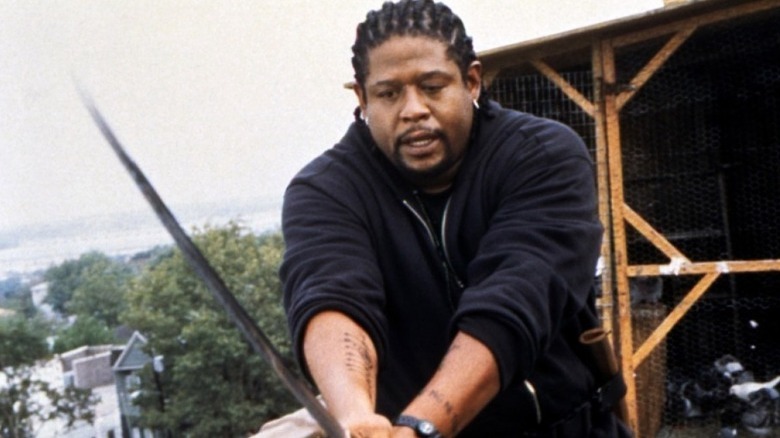
In Jim Jarmusch's offbeat "Ghost Dog: The Way Of The Samurai", Forest Whitaker's hitman is an oddity in more than one respect. Only communicating with his handler via carrier pigeon, and working for a mob that consists entirely of old, white men, this outcast figure feels even more isolated than usual. As with most film hitmen, he's a loner, with his only friends being a little girl from his apartment block (Camille Winbush) and a French ice cream man (Isaach De Bankole) who speaks no English. But while Ghost Dog speaks no French, they somehow understand each other anyway. It's a nice touch.
One of Jarmusch's most accessible films, "Ghost Dog" might sometimes veer into broad comedy -- the mafioso are comically out of touch, for instance, spending most of their time watching cartoons. But Whitaker's softly spoken hitman is incredibly humane. He's an enigmatic character, respecting codes of honor and loyalty that the gangsters themselves have completely abandoned. Constantly reciting samurai quotes from Yamamoto Tsunemoto's "Hagakure" and "Rashomon" over the course of the film, he feels like an old Western hero, out of place in a time where the rules have changed.
Salino
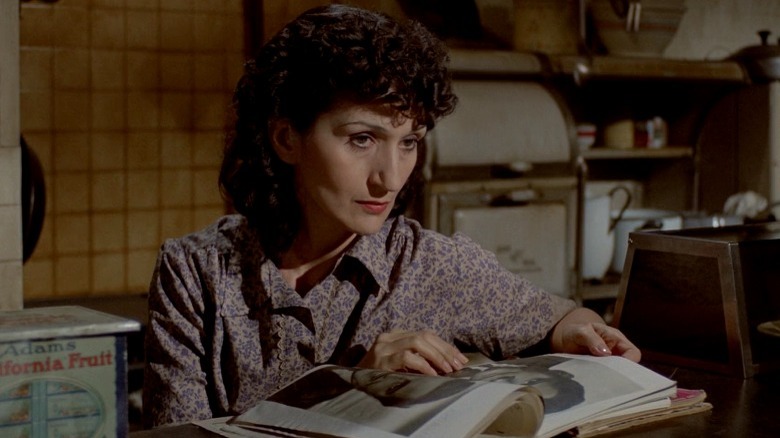
Spoilers for "The Sting" ahead.
George Roy Hill's "The Sting" often doesn't get credit for just how nasty it can be. In a film where there are multiple cons running alongside each other, the deepest cut is the way Johnny Hooker (Robert Redford) is thoroughly taken in, but not for money.
After ripping off the courier of a notorious gangster, Doyle Lonergan (Robert Shaw), Hooker is already on the run from two henchmen, Riley and Cole. However, when Lonergan gets frustrated with his men's failure to kill Hooker, he hires mysterious contract killer Salino to take him out. When the overzealous Cole still insists on tracking down Hooker, he is killed by Salino in an empty alley. Unlike many of the entries on the list, Salino feels like a genuine assassin, operating entirely in the shadows, and only killing when there are no witnesses.
In what seems like a separate subplot, Hooker begins a relationship with Loretta (Dimitra Arliss) the demure, no-nonsense waitress at his local café. In the film's most shocking moment, Loretta is shot in the head by a sinister looking gangster -- but it's only after she's dead that it's revealed that Loretta was Salino the whole time, and was seconds away from shooting Hooker herself. It's a chilling scene, and one that makes her actions earlier in the movie take on a whole new meaning. Her death is a dour, low-key moment in an otherwise fun, breezy film that really ups the stakes for the final showdown with Lonergan.
Robert E Lee Clayton
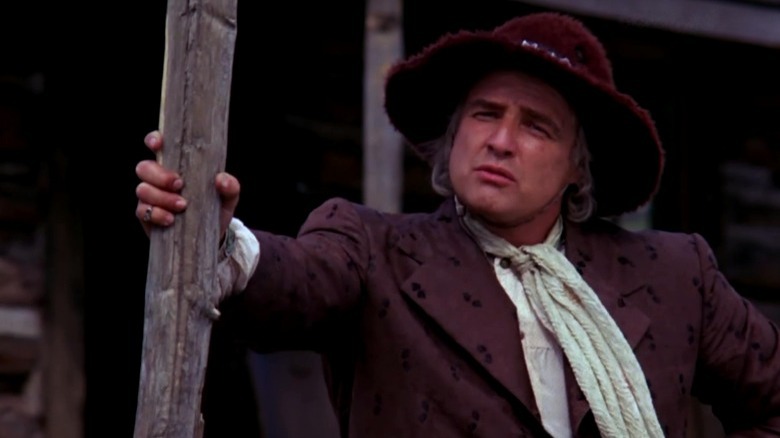
You don't get many hitmen in Westerns. Sure, you get bounty hunters like Klaus Kinski's malevolent Loco in "The Great Silence," and hired guns, such as the sadistic Wilson from "Shane," but hitmen are much rarer. The one exception is Marlon Brando as the eccentric "regulator" Robert Lee Clayton in Arthur Penn's underrated revisionist western, "The Missouri Breaks." Hired to kill the local rustlers, he quickly identifies the quiet Tom Logan (an understated Jack Nicholson) as the ringleader. As the two size each other up, Clayton toys with Logan's gang (employing a variety of disguises, including a preacher and an old lady) before picking them off one by one.
Brando's performance was initially dismissed as too outlandish and self-indulgent, but he's a terrifying character, outwardly comic with a sadistic streak. The deaths, when they come, are sudden and nasty -- whether he's jovially drowning his victims or impaling them through the eye.
While Logan is an outlaw, he's more moral than Clayton, who plays on ideas of honor to beat him. In a key exchange between the two, Logan mocks Clayton for shooting his victims from a mile away without ever having to look them in the eye, words that come back to haunt him in their final face off -- simultaneously one of the most anticlimactic and satisfying moments of the Western genre.
Nikita
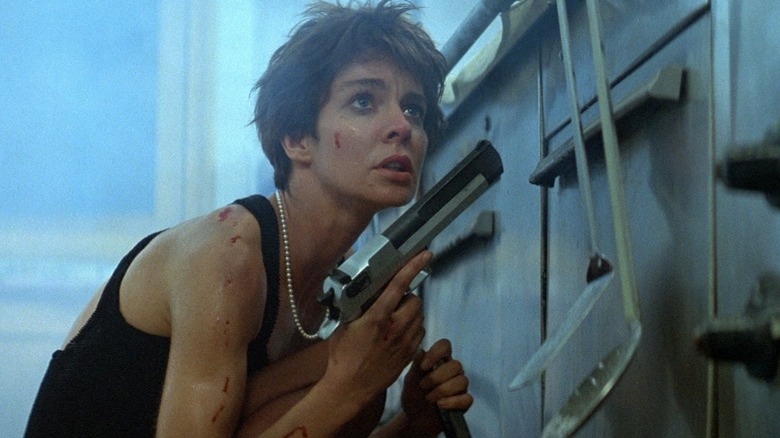
Luc Besson's youthful, punky style would grow more refined as he matured as a director, but there's a vitality to his early films that is pure cinema. This is clearly evidenced in "Nikita," a frenetic and audacious assault on the senses. Anne Parillaud is great as the juvenile delinquent drug addict Nikita, who is arrested when her whole gang is wiped out in a shootout with the police. With her file erased, she is trained up as an elite assassin by a mysterious organization. Parillaud makes her character both vulnerable and brutally efficient, and manages to show her character's strength despite being thoroughly dominated by her handler (Tcheky Karyo).
When Nikita falls in love with artist Jean Hughues Anglade, her professional life is compromised. That's when she takes matters into her own hands, demonstrating an agency of her own. In a warped way, she finds purpose and a drive through her work as an assassin, and the strength to walk away from it all.
A precursor to "The Bourne Identity," "The Long Kiss Goodnight," and "Hanna," as well as a partial remake in the form of Besson's own "Anna," the influence of "Nikita" can't be overstated, and it's a wonder Parillaud wasn't instantly propelled to stardom on the basis of her performance.
Claude
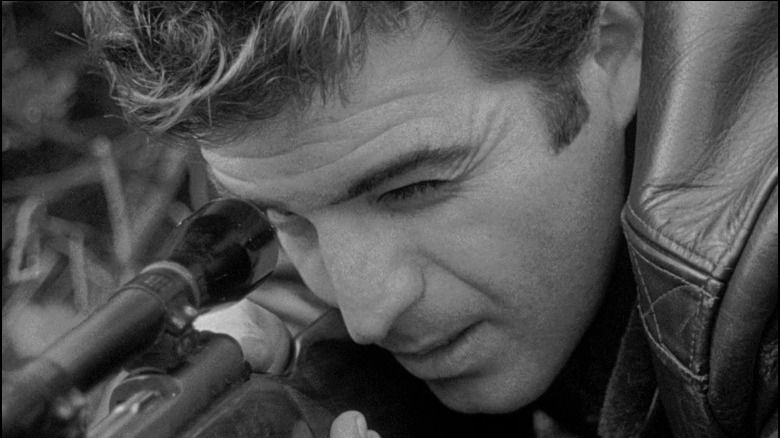
Despite being perfectly suited to it, there are surprisingly few hitmen in classic film noir. There are the titular Killers from Robert Siodmak's masterpiece, and Timothy Carey's rat faced horse killer in "The Killing," but by and large they are faceless goons you barely see. The exception to this is Irving Lerner's "Murder By Contract," a wonderfully sparse slice of pulp film noir. A big influence on Martin Scorsese (he paid homage to it in "Taxi Driver"), it's a masterclass in economic storytelling.
Claude (Vince Edwards) is an aspiring hitman, who quickly works his way up the rungs of his organization until he's the most sought after assassin in the underworld. Edwards gives a very self-consciously cool performance, and is convincing as a cipher who seems willing to take on any job. That is, until he's designated two assistants who accompany him to his latest target -- a female pianist -- which is when he begins to lose his taste for killing.
Irving Lerner's direction of the film -- which was made on a shoestring budget -- is minimalist but effective; he shows enormous restraint in his depiction of the murders, the overwhelming majority of which take place offscreen. It nonetheless sends a chill down the spine as Claude advances on one of his targets sitting blissfully unaware on the barber's chair. It's also blackly comic, with his two assistants acting as a kind of Greek chorus to Claude's numerous assassination attempts.
The Bride
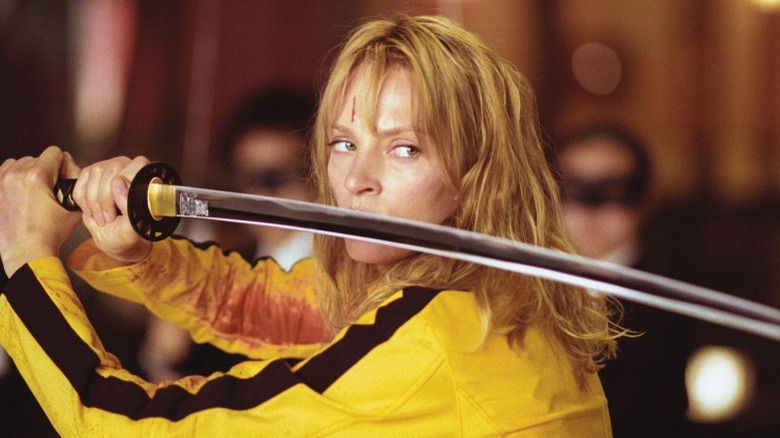
It would have been great if we had seen the Deadly Viper Assassination Squad actually taking out contracts on people over the course of the two "Kill Bill" films. As it is, we only really see the Bride (Uma Thurman) acting out personal business, rather than in her professional capacity, while her former colleagues are mainly shown enjoying the fruits of their labor. O-Ren Ishii runs her own army; Vernita Green finds domestic bliss; Budd circles the drain of life.
It's the proficiency of the Bride as an assassin that gains her a place on this list. Working her way up to the man who destroyed her future, she systematically takes out the other members of the assassination squad one by one. She's merciless, determined (punching her way out of a coffin in one insanely claustrophobic scene), and as demonstrated through the various methods she employs to take out her targets, accomplished in pretty much every method of killing. It's telling that the Bride kills more people over the course of the two films than all of the villains put together. The fight scene at the House of Blue Leaves accounts for most of the body count, as she decimates O-ren's personal army, the Crazy 88.
Interestingly, we are given very little of the Bride's backstory. We get flashbacks to her harsh training regime, but prior to becoming an assassin, she effectively has no past. Despite this, we are entirely on her side throughout, largely due to Thurman's incredible performance, which is full of pathos, righteous fury, and warmth, revealing the human being beneath the master assassin.
The Jackal
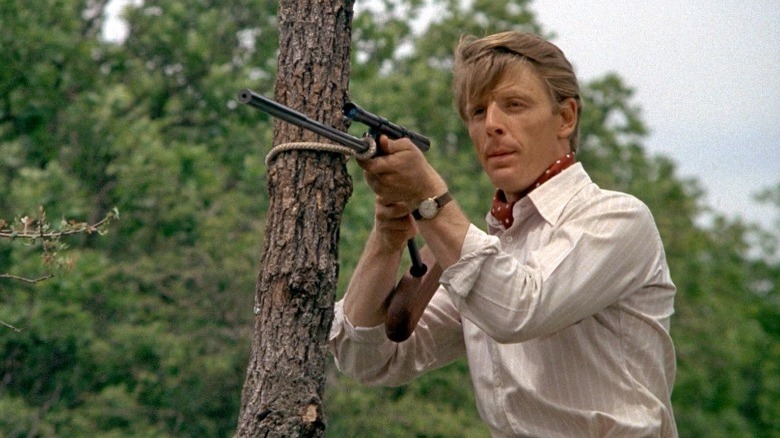
It's a rare feat to make a compelling film where the hitman is the main character while steadfastly refusing to make him sympathetic at all. But director Fred Zinnemann just about pulls it off. In "The Day Of The Jackal," Edward Fox's assassin, codenamed Jackal, is the most unapologetically cold, clinical assassin on this list, and yet there's a dignity and professional detachment to him that makes the audience root for him more than the dogged detectives on his trail.
Hired by a shady organization to assassinate France's president Charles De Gaulle, the Jackal efficiently makes his way to Paris, with a custom made sniper rifle, easily evading the authorities who are searching high and low for him, and managing to stay one step ahead throughout the film. What makes him so eerie is the way he so easily slips into the personas he adopts depending on who he's talking to. He doesn't kill indiscriminately, but also doesn't hesitate when he's backed into a corner, immediately switching from charming, polite English gentleman to ruthless assassin. And the great thing about Fox's performance is that you can see the instant he changes gear. It's a subtle, but clear change in demeanor, and makes him a truly chilling character.
Charly Baltimore
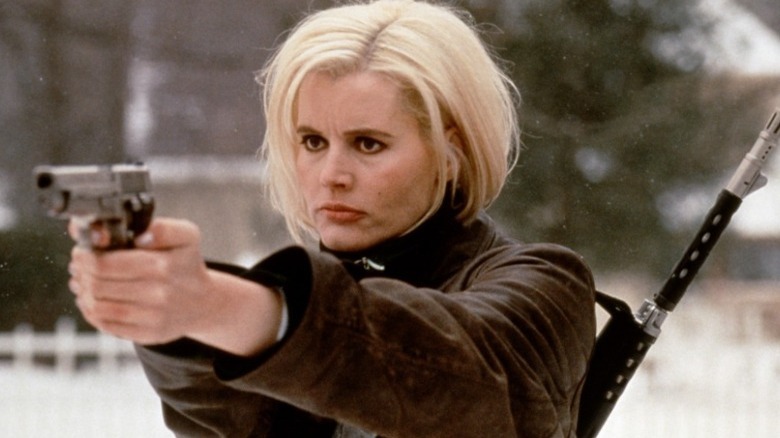
Shane Black's forerunner to "The Bourne Identity" is one of those films that keeps surprising you every time that you watch it. The dialogue in "The Long Kiss Goodnight" is full of witty one-liners, delivered brilliantly by the likes of Samuel L Jackson and Brian Cox, but the whole thing is held together by Geena Davis' performance in the dual roles as both tweedy schoolteacher Samantha Caine and her murderous alter ego, Charly Baltimore.
The plot itself may seem rote now -- unassuming teacher with a mysterious past receives a bump on the head that instigates disturbing flashbacks to her time as a stone-cold government assassin -- but the film still delivers where it matters. Davis' performance is convincing, and she's incredibly at ease whether she's playing a supportive wife or snapping a baddie's neck. She has some supremely cool moments, too. The scene in which she is tied to the waterwheel sticks in the memory, as do her interactions with her daughter as memories from her past begin to seep in.
Charly's relationship with Jackson's down-and-out private eye Hennessy serves as the beating heart of the film, as their dynamic changes along with her personality, going from a cocky, wisecracking partner to a useless sidekick who needs rescuing more often than not. Hennessy sums up the film best when he says, "When we first met, you were all like 'Oh phooey, I burned the darn muffins.' Now, you go into a bar, ten minutes later, sailors come runnin' out!"
Jackie Cogan
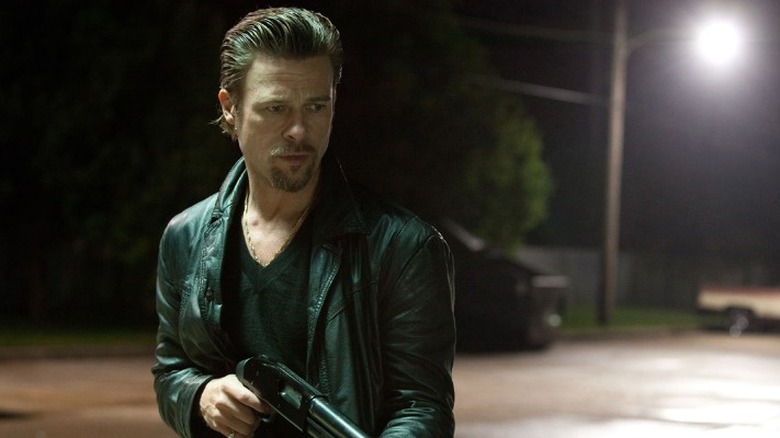
One of these days, Andrew Dominik's 2012 film "Killing Them Softly" is going to be recognized for the masterpiece it is. An incendiary anti-capitalist gangster thriller, based on the novel "Cogan's Trade" by George V. Higgins, Brad Pitt plays Jackie Cogan, the laconic hitman brought in to dole out retribution on the three men who knocked off a high stakes poker game. Cogan is a great character, utterly despairing of the mobs ineffective handling of the incident. He takes pains to kill his targets with as little emotion as possible, without any time for the victim to feel scared or be aware of what's going on. This doesn't make him sympathetic so much as efficient, abruptly killing one victim off mid-sentence. He predicts the necessity of killing one character early on even when the higher ups balk at the suggestion. He even takes on one of his targets as a potential apprentice before unceremoniously killing him with no warning. It might appear to be a cynical outlook, but it's one that is ultimately more merciful and authentic than many depictions.
A pretty accurate representation of the tone of Higgins' work, the hitman's life has never been quite so depressing -- demonstrated best by James Gandolfini's decadent hitman gone to seed, and the movie's business-like approach to killing. It might be Pitt's best film performance, and remains criminally underseen.
O-Ren Ishii
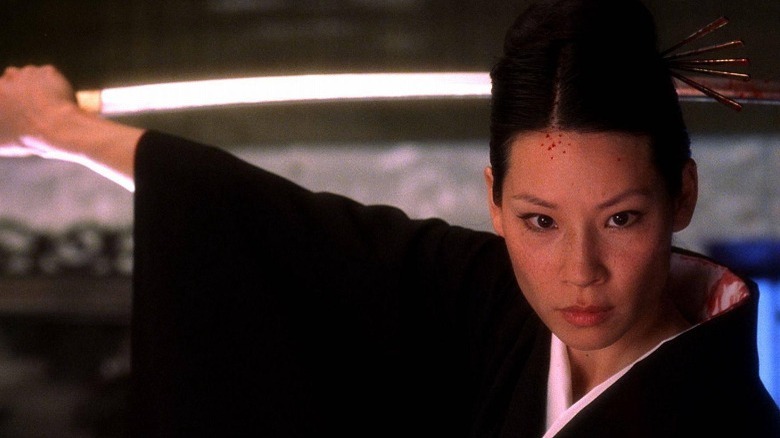
It's strange that the main villain of the first "Kill Bill" is given more backstory than the protagonist. In any other film, Lucy Liu's O-Ren Ishii could well be the main character; she is given an incredibly detailed history. The daughter of an American soldier who grew up on a military base in Japan, O-Ren witnessed her parents' murder at the hands of the local yakuza boss. After enacting her own revenge on the yakuza, O-Ren becomes one of the world's youngest assassins, and her meteoric rise is told through beautifully animated segments that flesh her out better than any other character in "Kill Bill." Indeed, there's an argument to be made that "Kill Bill: Volume 1" is more O-Ren's story than the Bride's. In any case, she's a demonstrably more successful assassin, as we actually see her in action, as opposed to the Bride, who we only really see enacting her revenge.
Liu plays the character just right, making her equal parts ruthless and pragmatic, smiling one minute and beheading underlings the next. It's clear that, despite their past enmity, she holds The Bride in high regard, but her ego prevents her from outright apologizing for attempting to kill her four years prior. Their duel is one of the highlights of both "Kill Bill" films (If only the final showdown with Bill was as impressive!) as they face off in a snow-covered Japanese garden in a loving homage to Lady Snowblood, one of the most iconic female assassins of cinema history. The reason why "Kill Bill: Vol 2" feels so anticlimactic is largely due to O-Ren's excellent characterization and the perfect showdown between her and the Bride -- there was no beating this.
Anton Chigurgh
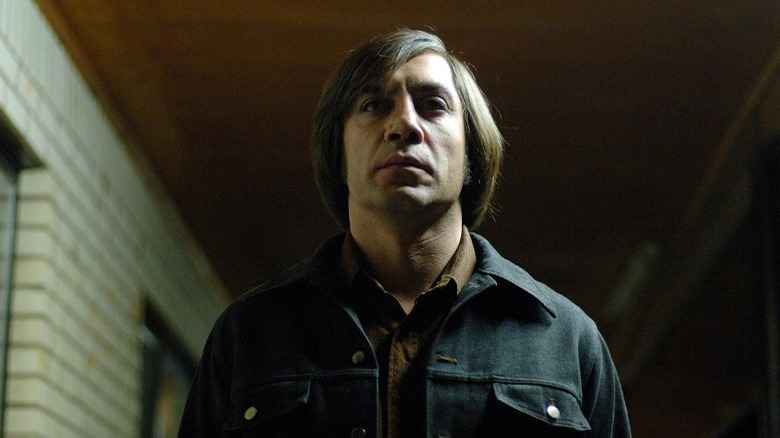
The Coen brothers have a fair few hitmen in their filmography, but none compare with Anton Chigurgh from "No Country For Old Men." Methodical, determined, and utterly insane, Chigurgh is the most terrifying hitman on this list, even with that haircut. Hired to find and kill Llewelyn Moss (Josh Brolin) and retrieve the stolen money he's found, Chigurgh pursues his mission with a grim determination, eliminating anyone who causes him any inconvenience with a casual indifference; he doesn't even look at the people he kills. Every interaction he has with any other character feels like it could end with him murdering them -- and a large portion do.
Ironically, the qualities that make him the perfect killer also make him uniquely unsuited for the job. He's an efficient killer, but when he catches the scent of other hitmen after the money, he ruthlessly takes them out before heading straight back to his employer and eliminating them too. His relentlessness gives him an almost supernatural quality, and his unique array of weapons (including a silenced shotgun and a bolt pistol), make him a nightmarish presence, and one that will not stop until he gets what he's after. It's one of the most disquieting portrayals of a true psychopath ever committed to film, and Javier Bardem deservedly won an Oscar for his performance.
Nie Yinniang
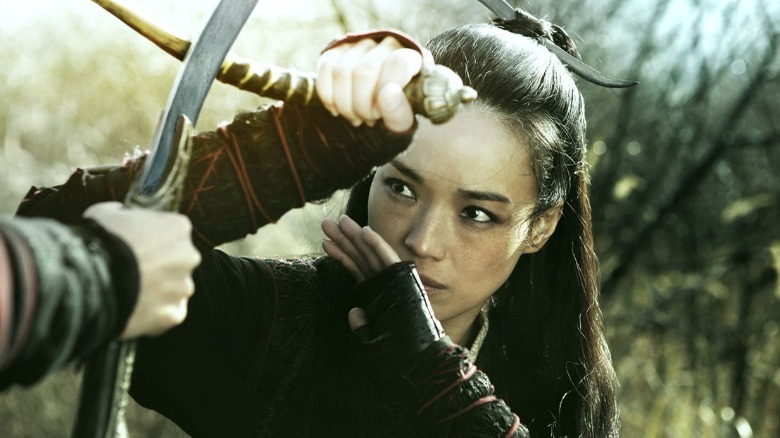
"The Assassin," is a cinematic riddle that might take a few viewings to piece together. But once you've worked it out, director Hou Hsiao Hsien's hypnotic Wu Xia film is incredibly rewarding. Shu Qi plays Nie Yinniang, an assassin who kills corrupt government officials at the behest of her masters, but is conflicted when she is sent to kill the governor of a local district -- who also happens to be her former lover. Qi's performance is both quietly determined and melancholy while remaining incredibly physical. As her trainer says at the film's opening: "Your skill is matchless, but your mind is hostage to human sentiments."
Yinniang has the ability to kill whoever she wants, but chooses to show restraint, which is what kicks the film off. This also sets her apart from so many other cinematic assassins, who routinely wipe out rooms full of people -- the moments where Yinniang silently descends from the rafters, hides in plain sight, or merely deflects sword attacks are far more powerful than if she killed everyone onscreen. That's not to say the martial arts scenes themselves aren't impressive; they are elegant but understated, and the absence of wire work that makes the fight scenes feel more grounded and real.
Ah Jong
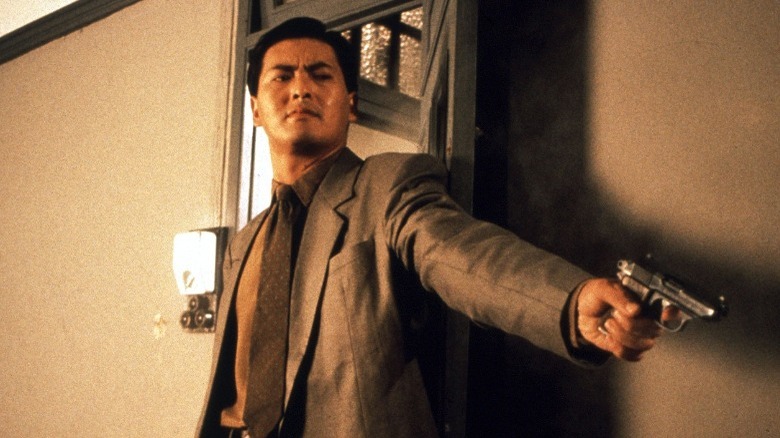
The consummate John Woo hero, Chow Yun Fat has played both sides of the law in their many collaborations. But his most humane performance is, slightly improbably, as the titular character in "The Killer." A slick assassin, Ah Jong has a rude awakening when he accidentally blinds an innocent bystander during a job, but then devotes himself to paying for her eye transplant surgery without ever revealing his identity.
Unlike many assassins on this list, Ah Jong does have a conscience, as he makes a conscious effort to retire, despite the efforts of his employers. However, most of his characterization comes through Chow's typically charming performance, and the uneasy alliance he forms with detective Li Ying (Danny Lee) that eventually develops into a deep friendship -- this is a John Woo film after all. Maybe the single most influential Hong Kong actioner of all time, "The Killer" has all of Woo's trademarks, and one of his finest set-pieces in the climactic shootout in the church.
Braddock
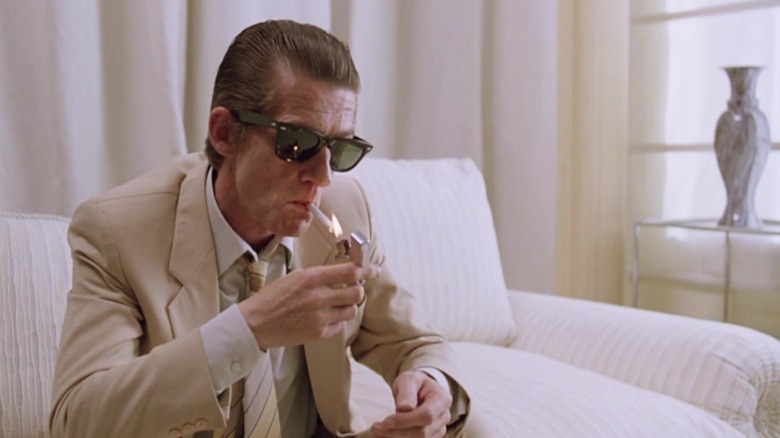
A cult film very popular among cinephiles, "The Hit" is part gangster movie, part road movie. It's a coolly elegiac meditation on mortality, and an antecedent to British Gangster films like "Sexy Beast," albeit low key and lyrical. Terence Stamp is the ostensible lead as Willie Parker, a snitch who's being escorted to Paris by lethal hitman Braddock (John Hurt) and his young driver Myron (Tim Roth in his feature film debut) after spending 10 years in hiding in Spain. But the two hitmen become increasingly disarmed by Parker's calm approach to his impending death.
Hurt is incredible as the cold hearted Braddock; immaculately dressed in a white suit and sunglasses, he's a coiled spring, capable of sudden bursts of violence, and serves as a counterpoint to Willie's outwardly relaxed character, right down to their final moments. Despite this, there are indicators that Braddock has a more sentimental side, sparing a witness (Laura Del Sol) he knows he should kill, seemingly because he admires her, instead deciding to bring her along with them. As the law closes in on them, he and Willie both approach death in markedly different ways, and despite Parker's musings on mortality, it's Braddock who ends up with the more philosophical, enigmatic ending.
Martin Q. Blank
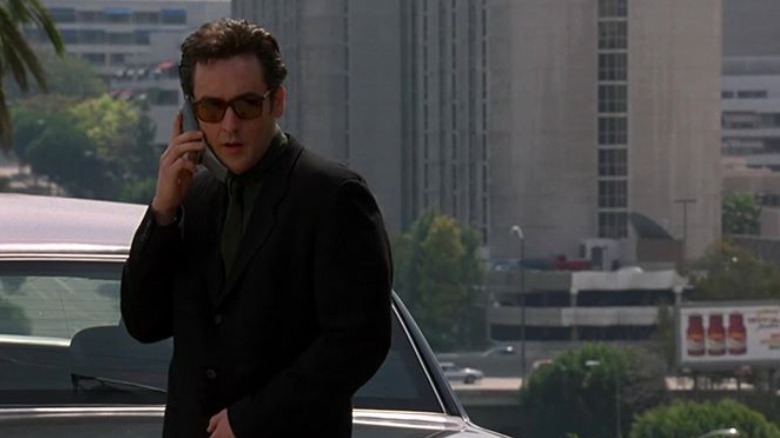
There have been several comedies about assassins ("In Bruges," "The Hitman's Bodyguard," and "The Whole Nine Yards" spring to mind) but none have really endured as much as George Armitage's black comedy, "Grosse Pointe Blank." John Cusack is the yuppyish hitman Martin Blank, whose latest job happens to coincide with his hometown's high school reunion. Despite being a genuinely funny comedy (with potentially the coolest movie soundtrack of all time), "Grosse Pointe Blank" doesn't shy away from the darker elements of Blank's personality. The contrast between light comedy and sudden violence is best demonstrated in the film's most famous scene, in which the goofy fun of the high school dance gives way to an incredibly visceral, brutal fight scene, ending with Blank stabbing his assailant in the neck with a pen.
Cusack is brilliant and incredibly plausible as a professional killer, giving a deadpan, neurotic performance. There's something just a little bit off about him -- he's a little too intense, and palpably uncomfortable getting through normal social interactions, let alone the horror of bumping into old acquaintances. But he seems entirely at home whacking a rival with a saucepan, or stabbing the president of Paraguay with a fork.
Joubert
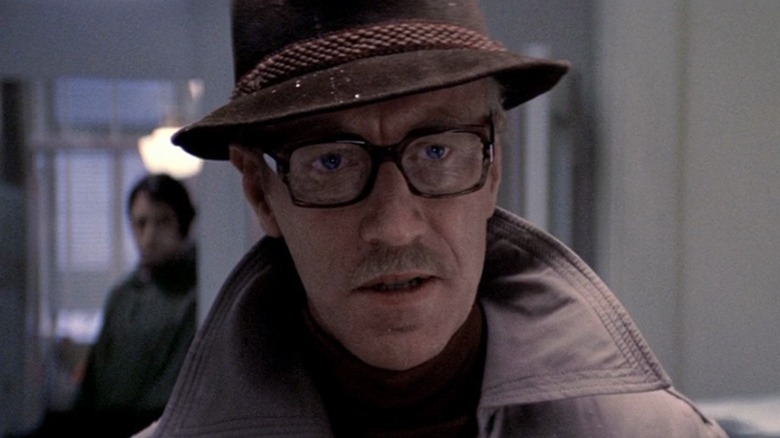
There's a misconception about hitmen -- that they are necessarily evil, or sociopathic. The fact is that they are rarely a conflict's antagonist; indeed the very best hitmen are the ones without any allegiance one way or the other. Joubert from "The Three Days Of The Condor" is the perfect embodiment of emotional detachment, and is probably the most diplomatic hitman of all time. Take, for example, this line he delivers to a shocked onlooker while staging one of his hits as a suicide:
"I don't interest myself in why, more in when, sometimes where, always how much."
It's difficult to dislike Max Von Sydow's assassin when he's waxing lyrical like this, and in a film populated with corrupt politicians, bureaucrats, and FBI agents, he emerges as an almost noble figure by the end of Sydney Pollack's conspiracy thriller. A zen-like hitman, found occupying himself painting miniature models, Sydow makes an unlikely assassin in his tweed hat and trench coat, looking more like a fisherman than a contract killer, but he cuts an imposing figure as he towers over Robert Redford's hero.
The mysterious, unflappable character appears intermittently throughout the film, often with a wry smile on his face as he coordinates the assassination of Redford's coworkers. The few scenes between him and Redford are filled with an understated dread, often without a weapon or a threatening word spoken. Joubert has no emotional investment, and he can't have his judgement clouded by emotion or personal animosity. Every action is deliberate and cautious, making him the perfect hitman, and more dangerous than the undesirable psychopaths that usually fill these roles.
Leon
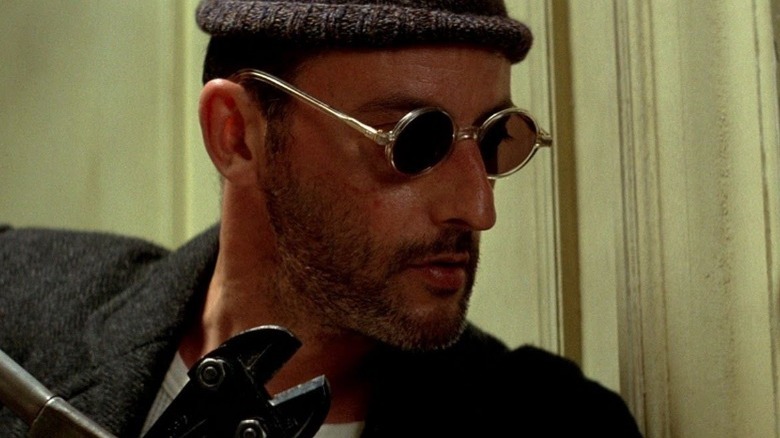
A mixture of "Lone Wolf And Cub," "Lolita," and Jon Cassavetes' "Gloria," Luc Besson's masterpiece is for many the definitive hitman movie. "Leon" has everything you want from a film about a hired killer: a truly detestable villain, a child apprentice, and some incredible shootouts. Constantly clad in a huge overcoat and circular sunglasses, with only a plant for company, Leon (Jean Reno) is an efficient, unflappable "cleaner," whose routine is upended when the family next door is murdered, and he reluctantly takes the orphaned Mathilda (Natalie Portman) under his wing.
The relationship between the two (thankfully toned down from the overtly sexual relationship in Besson's original draft) is a poignant one, with Mathilda's world weariness making a nice counterpoint for Reno's strangely childlike character. Outside of killing, he's guileless and awkward, and struggles to keep the increasingly bored Mathilda entertained. Besson subverts the audience's expectations, making the police detective Stansfield (Gary Oldman in his best performance) a drugged up, ruthless murderer, and the hitman himself a relatively innocent figure who spends his down time between jobs watching old movies at the local cinema. Giving a more fleshed out, nuanced rendition of the assassin he played in "Nikita," Reno's iconic portrayal of Leon remains most cinemagoers' go-to reference point for cinematic hitmen, and rightly so.
Jef Costello
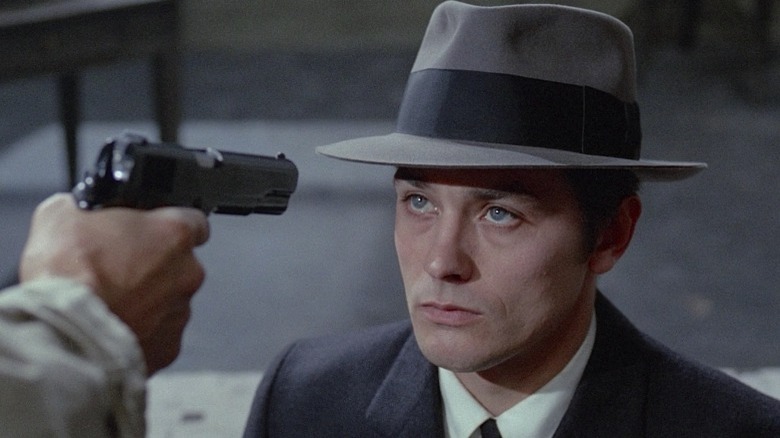
"Le Samourai," Jean Pierre Melville's most iconic film, is an existential crime thriller which is simultaneously incredibly influential (its fingerprints can be felt across most films mentioned in this list, and pretty much any film with a lone figure at its center), but also a film with one foot firmly in the classic era of film noir.
Jef Costello (Alain Delon) is a taciturn, meticulous character who lives a sparse, minimalist existence, with only a caged bird for company, which he uses as a security system. Wearing a trench coat, fedora, and immaculate white gloves, he's an entirely cinematic creation -- the rituals he goes through for each hit (establishing an alibi, stealing a getaway car, donning his white gloves) don't make a great deal of sense in the real world. But within the dream logic of Melville's film, it works. Delon makes a particularly romantic kind of hitman, with emotive blue eyes and a melancholy quality about him, even when beating up gangsters. "Le Samourai" is a film that celebrates the mythos of the hitman rather than the grim reality. It's pure cinema, and Delon's coolest, most enigmatic performance.
Read this next: The 15 Best Spy Movies Of All Time
The post The 20 Best Assassins In Film Ranked appeared first on /Film.
